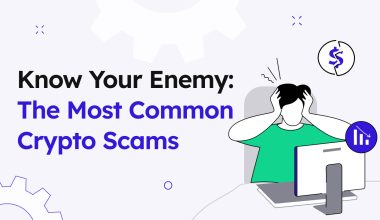The need for advanced security in crypto has become increasingly important in the last years. A booming industry attracts not only the pure of heart, after all. Staying safe in crypto should be your number one priority – you can’t have return on your investment if you don’t have any assets.
Unlike traditional financial institutions, the decentralized nature of cryptocurrency makes it difficult to retrieve lost or stolen funds. Falling victim to a scam could mean losing all of your assets in a matter of seconds.
So, let’s see how to prevent that from happening.
Using a non-custodial wallet
DeFi (Decentralized Finance) non-custodial wallets offer several security benefits over traditional custodial wallets. Here are some of the key advantages:
- Control over private keys: In a non-custodial wallet, you have complete control over your private keys. Private keys are used to sign transactions on the blockchain. This means that whoever holds the private key has control over the funds. With a non-custodial wallet, you are the only one with access to your private keys.
- No third-party risk: When using a non-custodial wallet, you don’t have to trust a third party with your funds. This eliminates the risk of the wallet service provider being hacked or going bankrupt, which could result in you losing your funds.
Read more: Introduction to crypto wallets and how to choose one
- Transparent transactions: All transactions on the blockchain are public and can be verified by anyone. Non-custodial wallets allow users to easily verify the transactions they are making on the blockchain. This increases transparency and reduces the risk of fraud.
- Open-source code: Non-custodial wallets are typically built on open-source code. This means that the code is publicly available for inspection and can be audited by security experts. This increases the likelihood that any vulnerabilities or bugs in the code will be discovered and fixed quickly.
- Interoperability: Many non-custodial wallets are interoperable, meaning that they can be used across different blockchain networks. This makes it easier for users to manage their funds across different platforms and protocols.
Okay, you’ve chosen a DeFi wallet – wise. But what’s the best way to protect the wallet?
Backing up your wallet
Storing your seed phrase securely
Backing up your wallet is standard procedure, and most won’t even let you create one without backing it up.
When you backup your wallet, you will be presented with a string of 12 or 24 randomly generated words. This string of words is called a seed phrase or security phrase.
The seed phrase enables access to your wallet if you lose or damage your device. You will also need it to import the wallet on another device or platform.
If someone has access to your seed phrase, they are one step away from stealing your funds.
There is a very good chance that once you get your seed phrase, you will NEVER have to enter it anywhere, except when recovering your wallet on a new device. If someone wants your seed phrase, no matter who, why, or where, it is 100% a scam and you will lose your funds.
Choose paper
One rule of thumb to keep in mind is to never, ever keep your seed phrase (and passwords) in a file on your device or even in the cloud.
All digital carriers are prone to the same vulnerabilities, including:
- Hacking and other cyber-attacks.
- Hardware corruption, potentially resulting in the loss of your private keys and passwords.
- Custodianship: Cloud storage is provided by a third-party. It is not yours.
Instead, paper is hack-proof and failure-proof. Write out your passwords and seed phrase on a piece of paper, make a few copies (by hand), laminate them (preferably at home), and keep them safe.
Keep them close, but out of sight. As we said above, the chance you will need them in your day-to-day crypto activities is close to zero.
Taking these steps makes your seed phrase impervious to theft or hacking, as paper simply cannot be cracked. It is also the most simple and reliable storage method.
Keeping your private keys safe
Private keys are like passwords that give you access to your crypto holdings. They also allow you to send them or receive them.
They are long strings of letters and numbers and are kept in your wallet. All DeFi wallets let you see your private keys, but in general you won’t really be needing them.
If someone else gains access to your private keys, they can steal your crypto holdings and you may not be able to recover them.
To protect your private keys, it is important to follow best practices for security. These include using a strong and unique password and enabling two-factor authentication. Keeping your software and hardware up to date also helps. Avoiding phishing scams helps a lot!
Use a strong password
Using a strong password in crypto is essential to protecting your cryptocurrency investments. Your password is the first line of defense against unauthorized access to your wallet.
A strong password is one that is unique, complex, and difficult to guess. It should be at least eight characters long and include a combination of uppercase and lowercase letters, numbers, and special characters.
An example of a strong password would be “Wb8&4k$9sT”, but for added security you can make it twice, even three times as long. This password is a combination of uppercase and lowercase letters, numbers, and special characters. It is unique, complex, and difficult to crack.
Also…
Do not use password managers
No matter how secure they may be advertised to be. Keep your passwords on regular paper – it is all you need. It is an inconvenience to always need access to the piece of paper and always enter the passwords by hand every time you log-in, but it is the safest way and a small price to pay for peace of mind.
Also, whenever entering your password on a desktop computer, it’s a good idea to use a combination of your physical and virtual keyboard – this prevents keyloggers, if your device is infected with any, from tracking your password.
Still, the better option is to just…
Use anti-malware and antivirus software
Malware and viruses can infect your computer or mobile device through phishing emails, malicious software downloads, and fake websites. Once infected, these programs can monitor your online activity, steal your personal and financial information, and even gain access to your crypto wallets and steal your assets.
As a rule of thumb, run a scan whenever your log-in to your wallets, so as to be absolutely sure that your system is clean and healthy, and no one can gain unauthorized access to your assets.
Use Two-Factor Authentication (2FA)
Two-factor authentication (2FA) is a security measure that adds an extra layer of protection to your cryptocurrency accounts.
When you enable 2FA on your crypto exchange or wallet, you will be prompted to enter a unique code along with your login credentials. This code is typically generated by an authenticator app on your smartphone, and it changes every few seconds.
The importance of 2FA in crypto investing cannot be overstated. Without 2FA, your account can be vulnerable to hacking and other unauthorized access attempts.
Beware of phishing scams
Phishing scams are a common tactic used by cybercriminals to steal personal information, including login credentials and private keys, from cryptocurrency investors. Here are some tips to help you stay safe from phishing scams in crypto:
Always double-check the URL
Phishing scams often use fake websites that mimic legitimate crypto exchanges or wallets. Before entering any sensitive information, make sure to double-check the URL to ensure that you are on the correct website.
It’s also possible that the URL contains letters that are foreign to Latin script. Scammers often resolve to using Cyrillic alphabet characters as replacements, due to their similarity. In time, you will learn to see them easily, but for now – stay vigilant.
Never click on suspicious links
Phishing scams may include links that lead to fake websites or download malware onto your device. If you receive an unsolicited email or message with a link, be cautious and verify the source before clicking on it. Better yet, don’t click anything. The email will point you to whatever it is you need to know – you can then easily search for it and find it.
Also, a lot of crypto platforms offer adding an anti-phishing message which is personalized and only available to you. Once you enable it, the platform will send it to you with every next email, so you know it’s the real thing. This is a good option to use and protect yourself from potential phishing attempts.
Be cautious with unsolicited messages
Phishing scams may use unsolicited emails, social media messages, or phone calls to trick you into giving away your personal information. Be cautious with any unsolicited messages and never provide sensitive information unless you are certain of the sender’s identity.
This also goes for social media, especially Twitter. If you’re familiar with the platform, you’ve probably seen the hundreds of same messages that offer “wallet support” immediately once you post something.
The rule is this: no one who has your best interest at hand will EVER offer you help beforehand. Only scammers will do that – they are the ones that come to you with offers of help and support. Don’t fall for it. If someone contacts you first on Twitter, Telegram, Discord, or any other platform for that matter, it is a scam.
Get rich schemes are always a scam
Whenever someone offers to double your money in an hour, day, or month – it is always a scam. Some of these scammers request that your send them your crypto with the promise that they will send you double the amount in due time. This is blatantly obvious to be scam, but still – do not fall for it.
Stay Up to Date with Security Measures
The crypto industry evolves faster than we can all keep track of. It is constantly evolving, and new security measures are being developed all the time. It is essential to stay up to date with the latest additions and best practices to ensure your assets remain safe. Follow trusted sources, such as crypto news websites, to keep yourself informed and up to date.
Conclusion
Taking steps to ensure your crypto assets remain secure goes a long way. Follow the advice listed in this article and you can significantly reduce the risk of your assets being compromised. Remember, it is always better to be safe than sorry, so those few hours more are completely worth it.
Keep reading, keep learning – explore more of our resources below.






